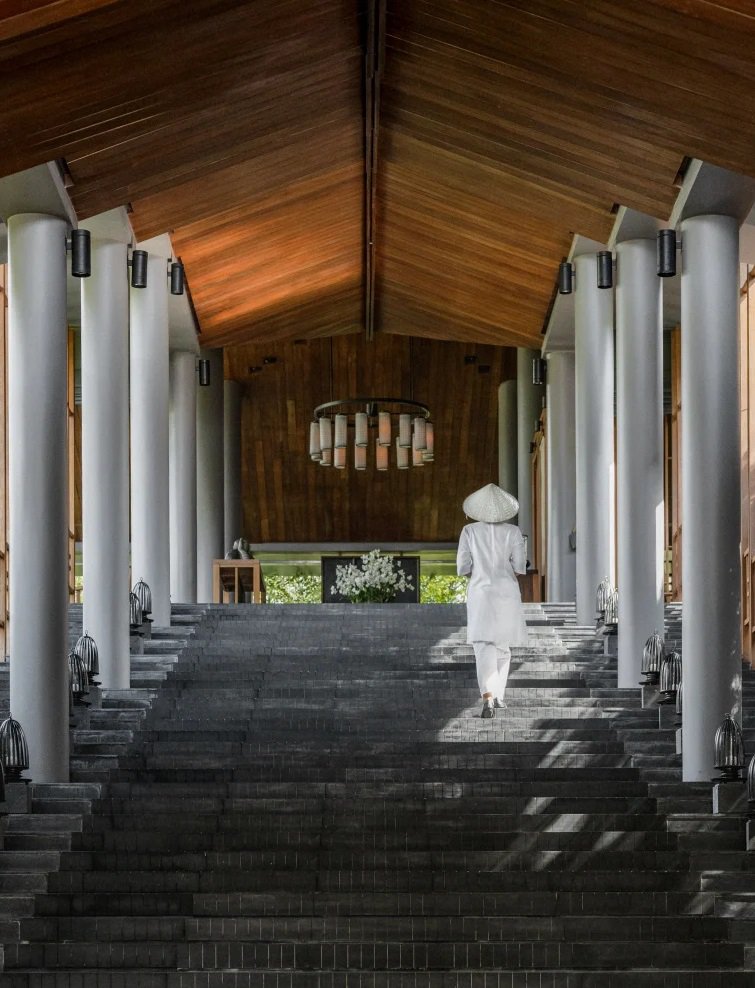Trends — Culture • Lifestyle • Future
The luxury hospitality industry is evolving to meet the demands of a rapidly changing world. Once a niche market, it has become a booming sector driven by global wealth and a shift toward immersive, personalised experiences. No longer focused solely on rooms and amenities, luxury hospitality now encompasses a full spectrum of experiences that shape every aspect of the guest journey.
Changing consumer preferences, emerging trends, and technological advancements are prompting brands to rethink strategies, with brand evolution becoming key to staying relevant and competitive.
In Asia, where hospitality is rooted in rich cultural heritage, luxury brands are balancing tradition with innovation, integrating technology, sustainability, and cultural immersion to redefine affluence.
For example, the Ritz-Carlton Tokyo blends traditional Japanese tea ceremonies with modern amenities, highlighting the balance between past and future that defines modern luxury. Successful brands are those that embrace these shifts while remaining true to their core values, positioning themselves for the future.
Embracing Technological Advancements
One of the key areas where hospitality brands have evolved is through technology. Today’s holiday-goers expect seamless digital experiences that start before they even arrive. Mobile apps, virtual concierges, and automated services have redefined guest interactions. For example, Mandarin Oriental introduced a digital concierge service, offering tailored experiences while maintaining high service standards. Technology not only enhances convenience but also improves operational efficiency. Four Seasons' Chat service allows guests to communicate in real-time, ensuring immediate responses.
Similarly, The Peninsula Hotels have transformed the guest experience with in-room tablets that control various room functions. This innovation, implemented in properties like The Peninsula Istanbul and The Peninsula London, has streamlined guest services, reducing front desk calls. By blending tradition with cutting-edge technology, these brands set a new standard for luxury hospitality.
Shifting Towards Sustainability and Ethical Practices
Hospitality brands have adapted to the growing demand for sustainability, especially among environmentally conscious younger consumers. A prime example is The Oberoi Vanyavilas Wildlife Resort in Ranthambhore, India, which sets a benchmark for sustainable luxury.
The resort harvests rainwater for irrigation, reducing strain on local water resources, and actively supports wildlife conservation. Through partnerships with local experts, guests learn about the region’s wildlife, including the endangered Bengal tigers.
Innovation in Design and Architecture
As brands push the boundaries of architecture and interior design, they are not only creating visually stunning spaces but also focusing on sustainability and functionality. The InterContinental Shanghai Wonderland is a groundbreaking luxury hotel built 90 meters into an abandoned quarry, with its floors build below ground and underwater. Designed by Atkins, its "earthscraper" design defies traditional norms and creates a visually stunning effect.
The hotel’s architecture emphasises sustainability, preserving the quarry's natural landscape and blending the structure seamlessly into its surroundings. Celebrated for both innovation and sustainability, the hotel has won numerous awards and is recognized as one of the world’s most unique, often appearing on prestigious lists like TIME Magazine’s World's Greatest Places. Its design pushes the boundaries of luxury hospitality and engineering.
Capella Ubud in Bali exemplifies luxury hospitality that blends architectural innovation with environmental consciousness. Designed by Bill Bensley, the resort features ultra-luxurious tented villas, each positioned to preserve the surrounding rainforest, avoiding the need to cut down trees. Crafted from locally sourced materials, the villas blend seamlessly into the landscape, while honouring Bali's cultural heritage with antique art, local textiles, and handcrafted furnishings.
Despite its focus on nature, Capella Ubud offers no shortage of luxury, with plunge pools, indoor and outdoor showers, expansive decks, and personalised butler service. The resort provides tailor-made experiences and cultural activities, offering guests an immersive and exclusive connection to Bali’s nature and heritage.
Cultural Immersion and Authentic Experiences
In an age where authenticity reigns supreme, luxury hospitality brands are evolving to offer guests experiences that go beyond lavish amenities. Travellers now seek deeper connections with the destinations they visit, looking for authentic, culturally immersive experiences that allow them to engage with local traditions, heritage, and cuisine.
For example, Rosewood Hotels & Resorts has embraced its "Sense of Place" philosophy, integrating local art, culture, and cuisine into each of its properties. By reflecting the unique character of each destination, Rosewood allows guests to connect with the local environment on a deeper level, making their stay more meaningful.
Aman Resorts has similarly evolved to meet the demand for immersive experiences. Known for its exclusivity and intimacy, Aman’s properties blend seamlessly with their surroundings, offering guests a sense of tranquillity and connection to nature. Whether in the rice fields of Bali or the deserts of Rajasthan, Aman delivers a majestic experience that is as authentic as it is indulgent.
Adapting to Changing Market Trends
The rise of millennial and Gen Z travellers has shifted the focus in luxury hospitality, with younger generations prioritising unique, experience-driven vacations over material possessions. As a result, brands are successfully evolving by expanding into new markets and creating travel experiences that resonate with younger, experience-focused travellers, ensuring continued growth and relevance in the luxury hospitality sector.
The Luxury Collection, for example, has strategically entered destinations like Vietnam and Cambodia, tapping into Southeast Asia's growing premium travel market and catering to holiday-goers seeking culturally rich experiences.
The Six Senses hospitality brand has also adapted by expanding its presence in newer markets such as Bhutan and Fiji, offering eco-conscious, wellness-driven retreats that align with the growing demand for sustainability and wellness tourism. Six Senses seamlessly integrates extravagance with local culture, providing guests with both indulgence and a deep connection to their surroundings.

Conclusion
As consumer preferences, market trends, and technological advancements continue to evolve, the hospitality industry must keep pace to remain relevant. While brand evolution is essential in meeting these changes head-on, luxury hospitality brands must strike a delicate balance between preserving their core values and embracing innovation, sustainability, and personalisation.